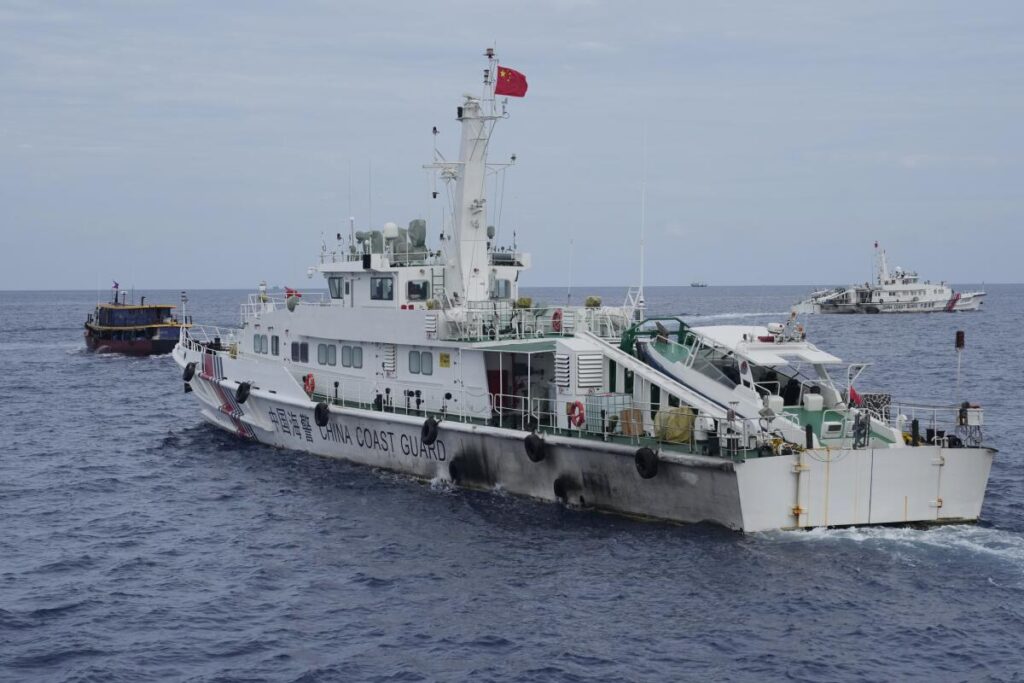
The Philippine coast guard said Monday it has complied with a presidential order to remove a floating barrier placed by China’s coast guard to prevent Filipino fishing boats from entering a lagoon in a disputed shoal in the South China Sea.
Philippine officials condemned the installation of the 300-meter (980-foot) -long barrier at the entrance to the lagoon at Scarborough Shoal as a violation of international law and their Southeast Asian nation’s sovereignty. The Philippine coast guard’s report that it has removed the barrier underscores intensifying Philippine efforts to fight China’s increasingly aggressive actions, against many odds, in one of the world’s most hotly contested waters.
Chinese coast guard vessels laid the rope and net barrier, held up by buoys, last week as a Philippine government fisheries vessel approached and more than 50 Philippine fishing boats swarmed outside the shoal, the Philippine coast guard said.
The Philippine coast guard said in a statement Monday night that it has successfully removed the floating barrier in a “special operation” in compliance with the order of President Ferdinand Marcos Jr. It did not provide other details like if the entire barrier was removed and when, and how Chinese coast guard ships, which have closely guarded the shoal for years, reacted.
“The decisive action of the Philippine coast guard to remove the barrier aligns with international law and the Philippines’ sovereignty over the shoal,” the coast guard said. “The PCG remains committed to upholding international law, safeguarding the welfare of Filipino fisherfolk and protecting the rights of the Philippines in its territorial waters.”
Earlier Monday, Philippine National Security Adviser Eduardo Ano said that “the placement by the People’s Republic of China of a barrier violates the traditional fishing rights of our fishermen.
Ano said in a statement that the Philippines “will take all appropriate actions to cause the removal of the barriers and to protect the rights of our fishermen in the area.” He did not elaborate.
In Beijing, Chinese Foreign Ministry spokesman Wang Wenbin said the shoal and its adjacent waters are “China’s inherent territory,” where Beijing “has indisputable sovereignty.”
A Philippine government fisheries vessel “trespassed into the waters” without China’s permission on Sept. 22, Wang said, and “attempted to intrude into the lagoon” of the shoal. “China’s coast guard took the necessary measures to stop and warn off the ship in accordance with the law, which was professional and with restraint,” he added.
It’s the latest flare-up in long-simmering territorial disputes in the busy and resource-rich waterway, most of which is claimed by China. The Philippines, Vietnam, Malaysia, Brunei and Taiwan are involved with China in the conflicts, which have long been regarded as a potential Asian flashpoint and a delicate fault line in the U.S.-China rivalry in the region.
Washington lays no claim to the sea passageway, a major global trade route, but U.S. Navy ships and fighter jets have carried out patrols for decades to challenge China’s expansive claims and promote freedom of navigation and overflight. China has told the U.S. to stop meddling in what it says is a purely Asian dispute.
The Chinese barrier denies Filipinos access to the rich fishing lagoon surrounded by underwater coral outcrops, Philippine coast guard spokesperson Commodore Jay Tarriela said.
He said China’s coast guard installs the removable barrier when Philippine fishing boats show up in large numbers near the shoal.
“It’s an illegal and illegitimate action coming from the People’s Republic of China,” Tarriela told reporters. “Definitely it affects our food security.”
A Philippine Bureau of Fisheries and Aquatic Resources ship which anchored off Scarborough on Friday and at least 54 Filipino fishing boats were ordered by four Chinese coast guard ships by radio to leave the territory, saying the Filipinos were breaching Chinese and international law. The Philippine fisheries ship insisted in its radio response that it was on a routine patrol in Philippine waters, Tarriela said.
The Philippines says Scarborough Shoal lies within its exclusive economic zone, a 200-nautical mile (370-kilometer) stretch of water where coastal states have exclusive rights to fish and other resources.
Those rights were upheld by a 2016 arbitration decision set up under the 1982 U.N. Convention on the Law of the Sea, Ano said.
China refused to participate in the arbitration sought by the Philippines in 2013, a year after a tense standoff between Chinese and Philippine ships at Scarborough. Beijing refused to recognize the 2016 arbitration ruling and continues to defy it.
The 2012 standoff ended with Chinese ships seizing and surrounding the atoll.
Chinese coast guard ships have also blocked Philippine government vessels delivering supplies and personnel to Philippine-occupied Second Thomas Shoal, resulting in near-collisions that the Philippine government has condemned and protested.
Washington has said it’s obligated to defend the Philippines, its oldest treaty ally in Asia, if Filipino forces, ships and aircraft come under attack, including in the South China Sea.





